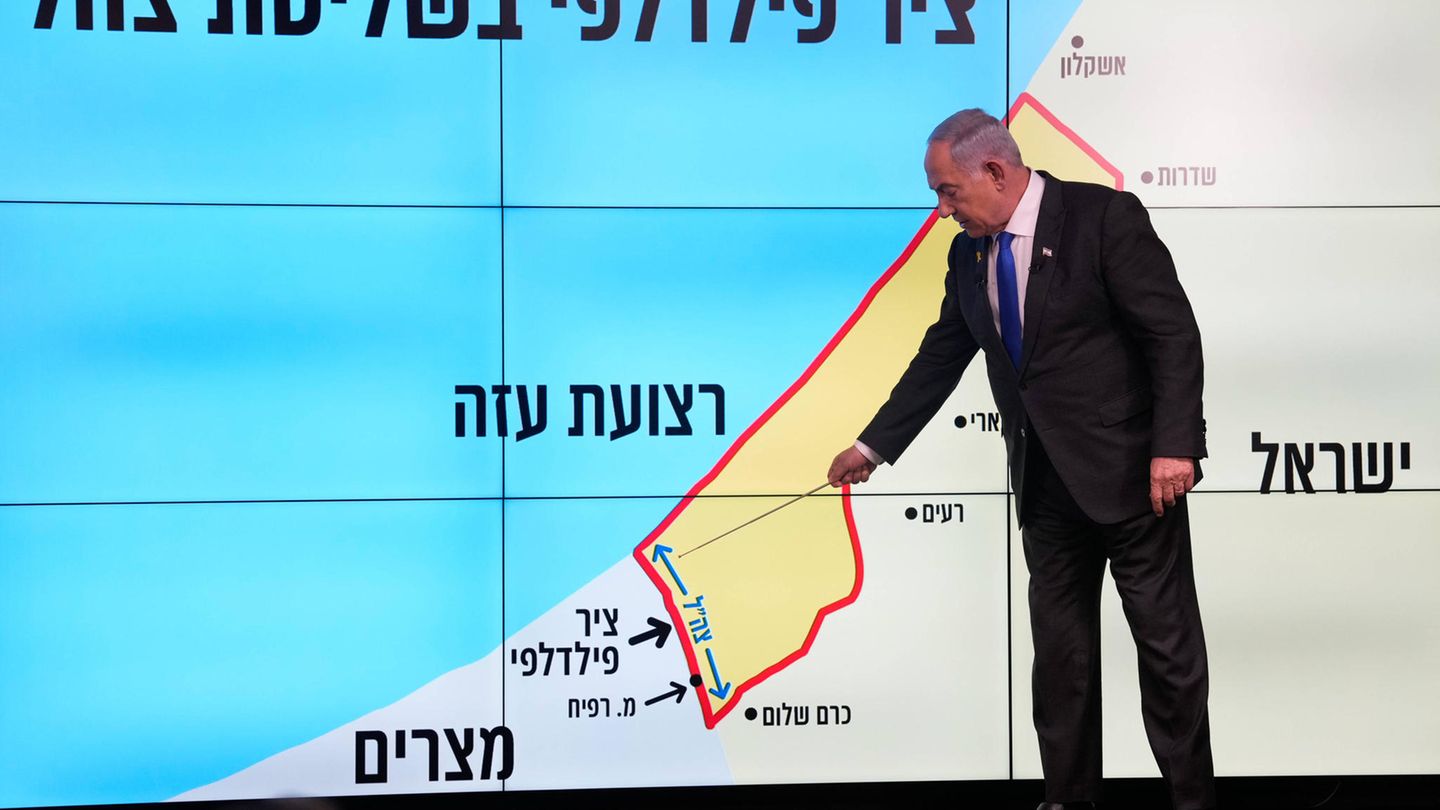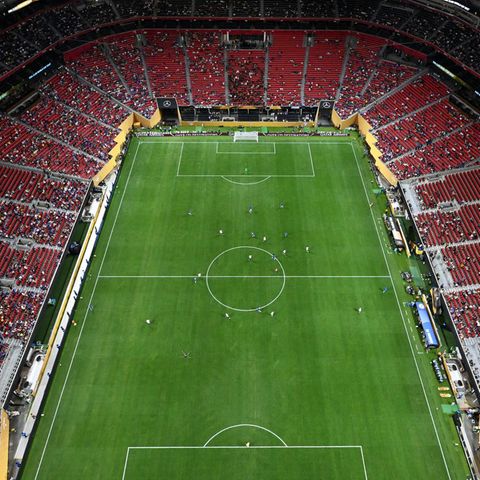Benjamin Netanyahu wants to keep his troops in the Philadelphia Corridor between Gaza and Egypt. Otherwise Israel will not be safe. Is that true? And: How did the buffer zone come about?
Mossad chief David Barnea had just made a new attempt at negotiations when his prime minister stabbed him in the back. In public, and during prime time. Armed with a wooden pointer, Benjamin Netanyahu stood in front of a map of a strangely enlarged Israel last Monday evening and tapped a piece of red line at the bottom left: the 14-kilometer-long border between the Gaza Strip and Egypt.
Barnea, his negotiator, had said just hours earlier in Qatar’s capital Doha that a multi-stage agreement to exchange Israelis still being held hostage by Hamas for Palestinians imprisoned in Israel could conceivably lead to a withdrawal of Israeli troops from the area. The initiative seemed to offer a spark of hope for the 101 people still being held hostage and their families, just days after Hamas cold-bloodedly murdered six hostages in their tunnel prison.
But the spark was extinguished with Netanyahu’s appearance. “The axis of evil needs the Philadelphia Corridor,” the prime minister thundered. “That is why we must control the Philadelphia Corridor. Hamas insists that we are not present there. That is precisely why we must be present there.”
Since then, it has become increasingly clear how alone Israel’s prime minister is with this assessment. Neither Egypt, nor Qatar, nor the US government accept his demand for a permanent Israeli troop presence in the Philadelphia Corridor.
Does Netanyahu want to torpedo the negotiations?
In addition, almost all well-known Israeli security experts consider it a charade that is not actually motivated by concerns about Israel’s security, but by the goal of torpedoing the negotiations to rescue the remaining Hamas hostages. Even the current defense minister has let it be known that he considers Netanyahu’s argument about the Philadelphia Corridor to be a pretext.
“The problem is not the Philadelphia Corridor. It is the absence of strategic decisions.” With these words, shortly after Netanyahu’s press conference, Benny Gantz, Lieutenant General, former commander-in-chief of the Israeli army and one of his country’s most experienced soldiers, expressed his indignation at Netanyahu’s maneuvers on behalf of many high-ranking figures from the army and secret services.
US President Joe Biden answered a reporter’s question about whether Netanyahu was doing enough to expedite the rescue of the hostages with a monosyllabic reply: “No.”
Their sons and brothers would have died in vain
Despite everything, Israel’s prime minister can be sure of support from the camp of his national-religious coalition partners. Many young men from this part of society took part in the Gaza war in elite army units. Compared to the proportion of the population that is national-religious, the number of those killed and wounded from their ranks is disproportionately high.
Many in their circles are prepared to weigh the lives of the hostages against those of their sons and brothers who were killed. They believe that their lives would have been in vain if Israel were to make concessions to Hamas.
In addition, the national religious groups see the Gaza war as an opportunity to move closer to their goal of a biblical Greater Israel, including the West Bank and Gaza Strip. For months they have been pushing ahead with the illegal acquisition of land in the occupied territories. They openly advocate the repopulation of the Gaza Strip. They have little interest in a deal or a ceasefire because they hope to gain an advantage from continuing the war.
Netanyahu’s Philadelphia speech came at just the right time for them.
It is also questionable whether Hamas leader Yahya Sinwar would accept a deal even if Israel were to clear the corridor. With the hostages, he would lose his most important bargaining chip. He may also be playing for time – in the hope that the Gaza war will still become a conflagration across the entire Middle East. Because Iran attacks Israel. Or because the smoldering uprising in the West Bank breaks out openly. Israeli security circles fear that Hamas is preparing a wave of suicide attacks against civilian targets there. A nightmare scenario.
The signal is: We are staying here
The Philadelphia Corridor will probably remain a bone of contention for the foreseeable future. Not so much because the area is strategically important. It is, but a withdrawal of the army – perhaps only temporarily – would hardly affect Israel’s security.
The narrow strip of desert is far too useful as a lever in the hands of all those on both sides who have a greater interest in the continuation of this war than in peace and security to be given up.
Meanwhile, Israel’s army has begun to widen and asphalt the old gravel road that the corridor has so far consisted of. The message is clear: We are staying here.
Where is the Philadelphia Corridor?
The 14-kilometer-long and only 100-meter-wide strip of no man’s land stretches along the southern edge of the Gaza Strip along the border with Egypt. The corridor was created in 1978 as part of the Israeli-Egyptian Camp David agreement – as a security zone between the Egyptian Sinai Peninsula, which Israel occupied until 1982, and the Israeli-occupied Gaza Strip. To this day, barbed wire walls and concrete barriers line the largely undeveloped, sandy area. The name “Philadelphi” comes from an Israeli army radio code. In Arabic, the strip of land is called the “Saladin Axis” (Mihwar Salahudin) because it runs across Saladin Street, the main traffic axis from north to south through the Gaza Strip.
Why was the buffer zone created?
Originally, Israel’s army used the corridor as a patrol route to control the southern border of the Gaza Strip between the Mediterranean Sea in the west and the Egyptian-Israeli border at the Kerem Shalom crossing in the east. The aim at the time was to protect Israel against its former enemy Egypt. As part of their 1979 peace treaty, Israel and Egypt agreed to demilitarize the neighboring Egyptian Sinai Peninsula. Israel also committed itself to maximum limits on the number of soldiers and military equipment it could station in the Philadephi Corridor.
Why did Israel give up control of the border strip?
Because it is not an external border of Israel. As part of the unilateral withdrawal of the Israeli army from the Gaza Strip and the evacuation of the Jewish settlements there in 2005, Israel’s army also withdrew from the buffer zone. In the same year, Israel and Egypt signed an agreement that allowed Egypt to station a 750-strong border force on its side of the border with the Gaza Strip, including light equipment: eight helicopters, 30 lightly armored vehicles, four patrol boats. On the Palestinian side, units of the Palestinian Authority (PA) were to ensure security along the border. But in 2007, the PA lost control of the Gaza Strip to Hamas. Since then, the Palestinian side of the border has been under the control of the Islamists. Until Israel’s army recaptured the Philadelphia Corridor as part of the Gaza War in May 2024.
What is the significance of the Philadelphia Corridor today?
Since 2007, Hamas has used its control of the border with Egypt to smuggle weapons into its territory through tunnels between Gaza and Egypt and to profit from taxing the movement of goods and people through the only border crossing between Egypt and the Gaza Strip in the city of Rafah. Israel has repeatedly put pressure on Egypt over the years to stop this, but with varying degrees of success. Between 2012 and 2016, Cairo cooperated with Israel, flooding tunnels and destroying thousands of homes on the Egyptian side of the border to combat smuggling.
From 2016, however, the Egyptian government sought good relations with Hamas because it needed the Islamists’ help to fight an Islamist rebellion in Sinai. At that time, Hamas severed its relations with the Egyptian Muslim Brotherhood. Israel also participated in the fight against the uprising in Sinai at that time with air strikes on rebel retreats there. As Egypt and Hamas grew closer, business with border traffic flourished on both sides of the border.
In 2018, Hamas and Israel signed an agreement to ease the Israeli blockade of the Gaza Strip, which permanently opened the Rafah border crossing. Since then, more and more goods have been coming into the Gaza Strip via Rafah: the share of total imports to Gaza rose from less than ten percent to 37 percent in 2023. This had two consequences: the movement of goods and people was largely beyond Israel’s control. And Hamas and the Egyptian authorities made a fortune from fees and taxes. Hamas alone is said to have earned 14 million US dollars a month from border business in Rafah.
It was not so much the smuggling tunnels under the Philadelphia Corridor that are often on display these days, but rather the regular border crossing in Rafah that Hamas used to import weapons and dual-use goods.
Why did Israel retake the Philadelphia Corridor in May 2024?
Israel had already taken control of the Rafah border crossing weeks earlier. Then, as the next part of the ongoing ground offensive in the city of Rafah, the recapture of the entire border strip with Egypt followed. Months earlier, Israel had announced that one of the war aims was to regain control of the Philadelphia Corridor for security reasons: tunnels were to be destroyed in order to prevent the smuggling of weapons and the escape of Hamas cadres.
But Israeli politicians have also repeatedly indicated that they want to enable as many Palestinians as possible to “leave” the Gaza Strip. Many Gaza residents understood this as a threat to drive them across the border into Egypt. For this reason, Egypt has kept the border with the Gaza Strip closed since October 7, 2023, and has only allowed Palestinians from Gaza to enter in very small numbers and after paying horrendous fees. The government in Cairo fears that Egypt will be destabilized if millions of Palestinians come to the country – and with them Hamas cliques infiltrate the Sinai. The conditions in Jordan in the early 1970s, when Palestinian militias threatened the rule of the royal family there, and in Lebanon during the civil war in the 1980s and 1990s, which was triggered in part by the presence of Palestinian refugees and armed militiamen, are warning examples for Egypt’s government. Egypt increased its military presence along the Philadelphia Corridor by 40 tanks and other armored vehicles in the spring.
Would a permanent Israeli military presence in the Philadelphia Corridor jeopardize the peace treaty with Egypt?
“The Philadelphia Corridor must be in our hands. No other arrangement could ensure the demilitarization (of the Gaza Strip), which is our goal,” said Israeli Prime Minister Benjamin Netanyahu at the end of 2023. Since then, official voices from Cairo have warned that a renewed Israeli occupation of the corridor would be a violation of the 45-year-old peace agreement between the two states. An Egyptian soldier died in an exchange of fire between Egyptian and Israeli troops on the border at the end of May 2024.
Officially, the regime of General Abdel-Fattah al-Sisi regards the Israeli conquest of the Philadelphia Corridor as a violation of Egyptian sovereignty. Nevertheless, Cairo is trying to calm the situation, because heavily indebted Egypt is dependent on American military aid and international loans. Israel has also made it clear that in the fight against Hamas, it is prepared to cross Cairo’s red lines.
Source: Stern
I have been working in the news industry for over 6 years, first as a reporter and now as an editor. I have covered politics extensively, and my work has appeared in major newspapers and online news outlets around the world. In addition to my writing, I also contribute regularly to 24 Hours World.




